In the digital age when everything happens at an accelerated pace, customer service requirements are extensive. The customers need swift response, individual attention and 24 hours customer service. To businesses, it implies coming up with new ideas of how to address them without saturating their customer care units. Chatbots based on AI are one of the solutions that have proven to become a game-changer.
Chatbots based on AI are taking the customer-business communication to a new level and ensure efficient, swift, and affordable customer support all the time of the day. In this article, we will explore the way in which the AI-powered chatbots are changing customer service, advantages of their use, and the reason why companies are moving towards the use of the technologies.
What Are AI-Powered Chatbots?
Chatbots with AIChatbots with AI are computer programs that simulate conversations with humans.
They are introduced to communicate with the users in the form of texts or voice, completing an array of tasks, starting with answering frequently asked questions and ending with the comprehensive solution to the customer problems.
Compared to the standard chatbots, which make use of pre-programmed answers, AI chatbots make use of Natural Language Processing (NLP) and Machine Learning (ML) to comprehend and interact in a conversational way.
Using AI to process and understand large volumes of data, being trained on the previous interactions and integrating new information, chatbots powered by AI can effectively deal with all sorts of customer care functions (be it simple questions or somewhat more complex requests such as product suggestions or diagnostics).
Why Businesses Are Turning to AI Chatbots
Compelling customer needs are increasing, and in order to accommodate the demand of speedy, efficient, and accessible customer service, companies are resorting to the use of AI-driven chatbots. These are some of the major reasons why AI chatbots are becoming an important part of the modern customer service strategies:
1. Meeting Customer Expectations for Speed and Efficiency
The customer today wants quick customized response. Chatbots powered by AI can give immediate response to inquiries, thus making the response time a significantly short period and enhancing total efficiency. Chatbots, unlike human agents, are able to simultaneously process several queries and, therefore, customers will not have to spend a lot of time in long queues.
2. Cost-Effectiveness
Having a big customer service may be costly particularly in the case of businesses that attract extraordinary number of customer contacts. As a result of automating repetitive processes and requests, AI chatbots lower the number of required workers and significantly decrease the cost of operations, so that human agents concentrate on more complicated matters.
3. 24/7 Availability
The AI chatbots have a potential to work 24 hours and support customers in a consistent manner regardless of the human working schedule. And it is specifically useful in situations where companies have international clients and customers in different time zones or in cases where a business requires fast response in non-office hours.
4. Scalability
How AI Chatbots Enhance Customer Service
Chatbots are not simple automated response solutions. They are very smart utensils that can change the approach of giving the customer service in business. Let us take a glimpse of how AI chatbots enhance customer service:
1. Instant Response to Customer Inquiries
Among the greatest benefits of AI chatbots, there is a capacity to offer instant answers to clients questions. AI chatbots can immediately deliver the appropriate information when customers want to know more about products and when they seek help through troubleshooting a problem or when they want to track an order.
Chatbots can ensure businesses fulfill their needs of prompt solutions, which customers request, and soothe them by not feeling frustrated and increasing their satisfaction.
2. Personalization and Customer Engagement
Through customer data and study of previous interactions, AI chatbots are able to make personal recommendations, responsive to customers and offer specific services. Customer engagement can then be optimised through such a personalised approach, since customer interactions can then be made more relevant and meaningful.
To give an example, AI chatbot might suggest products that a customer bought previously or used to browse or even give a discount to the services that the customer has shown interest in.
3. Handling High Volumes of Customer Requests
At rush hours, like holidays or when the company is launching a new product, the customer service departments might be overloaded with the number of requests. AI chatbots will be able to manage high request rates at once, which will guarantee that all customers will get the necessary help on time. This helps to have more efficiency and avoids the occasion in which the human agents become overwhelmed.
Additionally, the chatbots can be in full force together with human agents where elaborate matters that must be addressed by human agents are elevated. This assists the companies to effectively manage the workloads and have high service levels.
4. Reducing Human Error
Human beings are susceptible to errors and in extreme cases; they are subjected to high-stress situations or recurring tasks. In contrast, chatbots using AI are stable and steady. They give customers access to proper information as they have programmed data and algorithm, making sure that customers are getting the right answers all the time.
This elimination of mistakes does not only increase customer satisfaction but also enables companies to uphold high service levels.
5. Streamlining Routine Tasks
One of the prime areas AI chatbots can be used is automation of repetitive tasks like order processing tasks, responding to frequently asked questions, requesting bookings or shipping notifications. The businesses can release resources to engage in more value-added complex activities as they free those tasks of the human agents.
It saves a lot of time and permits the business to handle other sectors of customer service like product innovation or customer loyalty programs.
Benefits of AI-Powered Chatbots in Customer Service
Adoption of AI-based chatbots has numerous advantages both to the business and the customer. Let us touch upon some of the most important benefits:
1. Enhanced Customer Experience
AI chatbots enhance gains in overall customer experience through quick, personalized caring that operates 24/7. Customers end up more satisfied and loyal because they can find out the answers to their questions anytime, anywhere, without spending time in lengthy queues.
2. Reduced Operational Costs
AI chatbots eliminate the requirement of hiring a big workforce of human representatives to take care of customer care, hence saving money. They are able to process diverse routine, and this frees income of the businesses to concentrate on more strategic functions. This may lead to a substantial saving in labour costs by the passage of time.
3. Increased Productivity
Solving repetitive and low-value tasks, AI chatbots will free human-agent time to concentrate on more complicated problems, requiring emotional intelligence, problem-solving, or creativity. This enhances customer service team productivity and the general efficiency.
4. Better Data Collection and Insights
AI chatbots can monitor and measure the interactions between the customers in order to give the business a closer look at what customers like, what are their pain points, how they behave in the case of customer preferences. The data can be utilized to enhance products, services as well as marketing strategy.
5. Scalability
With the increase in business, accordingly grows customer service. With AI chatbots, it is easy to scale when serving more customers due to the number of customer inquiries, and this means that the business can afford to keep its high quality service without necessarily employing more people.
Challenges of Implementing AI-Powered Chatbots in Customer Service
Although chatbots have various benefits resulting in efficient customer service avenues, there are several challenges that the business needs to address in order to incorporate them in their services. These are some of the challenges; let us see how these can be overcome.
1. Limited Understanding of Complex Queries
However, although the chatbots that run on AI would excel at basic, routine requests, they may fail to answer complex or specialized questions by customers. As an example, when asking the chatbot anything demanding a profound awareness of a given product or scenario that is not included in the training information, the system can become dizzy.
Solution: To address this challenge, it is possible to introduce a combination of chatbot and a human agent so that trivial questions should be resolved by a machine/ robot and more complex cases can be reassigned to a human being. Also, since the chatbot uses AI algorithms, it can be trained continuously using machine learning and updated to better deal with more complex questions in the future.
2. Lack of Human Empathy
AI chatbots are efficient, but they lack the empathy and emotional intelligence that human agents bring to customer service. Customers often seek emotional reassurance or understanding during complex issues, which chatbots may struggle to provide.
Solution: To reduce this, the issue can be worked around by programing chatbots to identify and interpret sentiment by analysing it. When the feelings of a customer are considered as negative or frustrated, the chatbot can easily move it to the human agent that can extend more emotional support.
3. Data Privacy and Security Concerns
Chatbots with AI capabilities gather information about customers and interpret them so as to enhance their service. Nevertheless, due to the growing significance of data privacy and protection, companies also have to make sure that they effectively adhere to such an act as GDPR, HIPAA, or CCPA. Clients might not be willing to communicate with a chatbot when they are afraid of the privacy of their personal information.
Solution: The companies need to combine effective data protection mechanisms and be open regarding the way the information is collected and used. To keep customers trust, audits should be carried out regularly, and international data privacy standards should be complied with.
4. Integration with Existing Systems
Embedding AI chatbots into the current customer support processes, namely CRMs, support systems, and legacy systems may be difficult. Smooth aggregation is necessary as we do not want the chatbot to receive the wrong customer information or make wrong responses.
Solution: Firms can opt to select chatbot players that provide an easy CRM integration that includes other tools. The process of integration can also be easy by investing into platforms that have flexible APIs and customer support.
5. Continuous Maintenance and Training
In order to be competent, AI chatbots need to be maintained continuously and their knowledge base updated on a regular basis. Businesses will have to engage in continuous training of the machine learning model of the chatbot to enhance the overall setting and ensure its applicability to consumer requirements.
Solution: One of the ways to maintain AI chatbot in a top condition is to review chatbot conversations periodically, reviewing user feedback and retraining system with new information. One should continue to innovate the system in line with the demands of the customers.
Industries Benefiting from AI-Powered Chatbots
Chatbots are deployed in most industries to enhance customer service through AI implementation. The following are some of the major industries which can benefit with the use of this technology:
1. E-commerce and Retail
Chatbots on e-commerce sites will aid customers in terms of identifying products, responding concerning the product details, and guiding customers on an order progress as well as returns. Chatbots can also make personalised recommendations as per browsing and purchase histories and thus, there will be an enhanced experience of shopping.
Example: An internet-based clothing store utilizes AI chatbots to help individuals find clothing due to their likes and dislikes, size and fashion preferences. The chatbot will provide the basic answers to customer requests such as shipping cost, returns and exchange policies and product availability; therefore enabling the customer service personnel to address the complicated inquiries.
2. Banking and Finance
Banking and finance industries use AI chatbots to offer numerous services including helping customers to inquire about their accounts, and conduct transactions, offer financial advice, and also help customers with requirements of the loan application. Chatbots likewise assist banks to automate procedural activities, like checking deposits and money drains.
Example: A bank employs an AI-based chatbot to assist people in finding the way how to obtain a mortgage. The chatbot gathers the required data, makes clarification, and even programs visits to the mortgage consultants. Automating these processes enable the bank to offer better and faster service to customers.
3. Healthcare
AI chatbots in healthcare give patients the ability to have access to information on symptoms, ways to treat those symptoms, and the drugs used in treating them instantly. They are also capable of appointment setting, scheduling and reminder to patients about upcoming examinations and basic health counsels.
Example: An example of this is a healthcare practitioner embracing an AI chatbot to help patients make appointments, verify insurance coverage eligibility and respond to broad health services questions. The chatbot may also be used to remind about the follow-ups and prescriptions, increasing patient adherence.
4. Telecommunications
AI chatbots are also applied by telecom companies that receive customer service questions, including billing problem, service interruption, and technical assistance. Telecom AI chatbots would allow the support teams to be more efficient, because they could address typical customer requests, such as password resets, or network troubleshooting.
Example: A company like a telecommunication provider can utilize a chatbot to resolve internet connectivity issues. The chatbot poses a set of diagnostic questions to the customers and even takes them through the troubleshooting procedures. In case the problem cannot be solved, the chatbot transfers the case to a human technician who helps solve the problem.
5. Travel and Hospitality
AI chatbots are used in travel and hospitality industries to assist customers to book flights, hotels, rental cars and tours. Chatbots may even assist with flight statuses, information on the availability of amenities in the hotels and tourist attractions etc. thereby smoothing out the process of travelling.
Example: An online travel company employs an AI chatbot to assist users in searching and booking flights, suggest traveling destinations as well as give instant information about flight delays, cancellations. Automation of these tasks means that the company will be able to provide customers with a smooth experience and to address a greater number of inquiries.
The Future of AI-Powered Chatbots in Customer Service
The future of AI-powered chatbots is bright, and there are numerous developments that will expand their capacity and allow them to spread in terms of customer service.
1. More Advanced Natural Language Processing (NLP)
With further development of the NLP, AI chatbots will be able to understand and process advanced queries with much more ease. Due to the improvement of sentiment analysis and context recognition, the ability of chatbots to communicate with customers in a more mature and humane way will increase, and customer communication will become much more human.
2. AI Chatbots Becoming More Proactive
The next level of AI chatbots can look in the future and start providing more proactive customer care. As an example, chatbots would be able to recognize possible problems a customer might have even prior to them occurring like observing customer buying habits in order to tell when a product that they bought needs to be replaced or serviced.
Example: A home appliance company to schedule and remind the customer when it is time to clean the appliance through the data on how much they have used, this can be through an AI chatbot or even advising the customer on what spare part they should get when the system informs the customer that the product is nearing its lifecycle.
3. Deeper Integration with Other AI Technologies
Customer service chatbots of the future would have a comprehensive level of integration with other AI based technologies such as predictive analytics, voice recognition, and machine learning to provide an even greater level of support. As an illustration, AI-automated borrowers may eventually become the norm in various customer care applications so that customers can ultimately talk to businesses through voice searches.
4. Increasingly Autonomous Customer Service Systems
The already self-sufficient chatbots are going to become even more autonomous as the AI technology develops, being able to perform more specific tasks and less work is under the care of a human mind. Such bots would get smarter, get better at what they do every time they interact and more importantly, they will be in a better position to deal with more complicated issues without the help of a human being.
5. Better Emotional Intelligence
Summary
Chatbots with AI are already having a tremendous influence in customer service giants, as they provide companies with an opportunity to serve faster, improve customer service radically and effectively, as well as personalize their communications.
With time, as AI continues to develop, the chatbots will become even more sophisticated, as they will be able to deal with more complicated queries and will have a human-like nature.
Despite the challenges that still exist, like the resolution of complex challenges and a high level of data safety, the future of AI chats used in customer service is exceptionally bright.

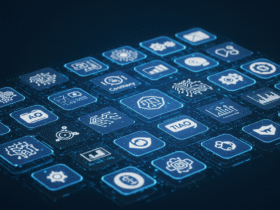

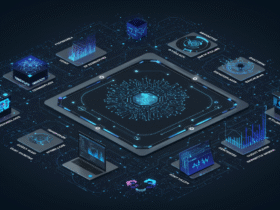
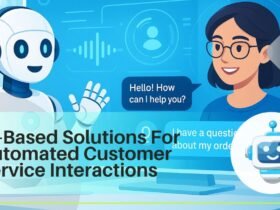








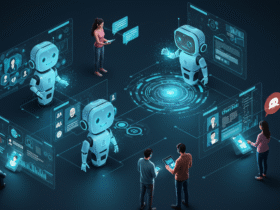


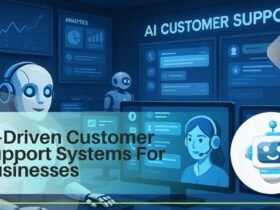

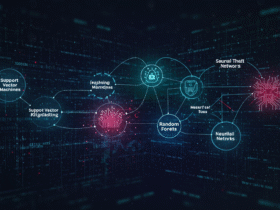




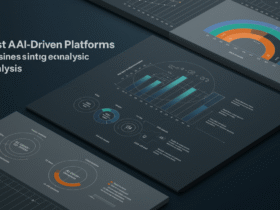


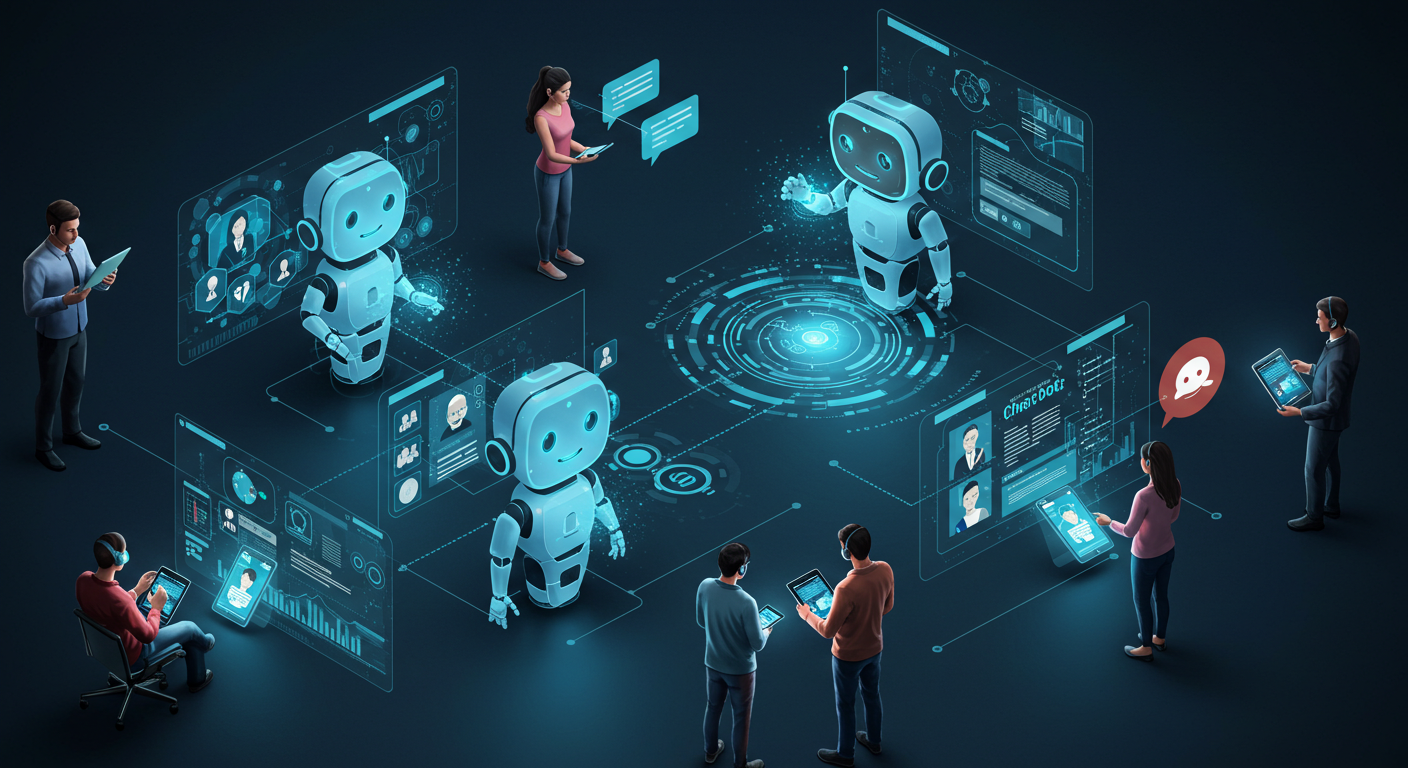


Leave a Reply